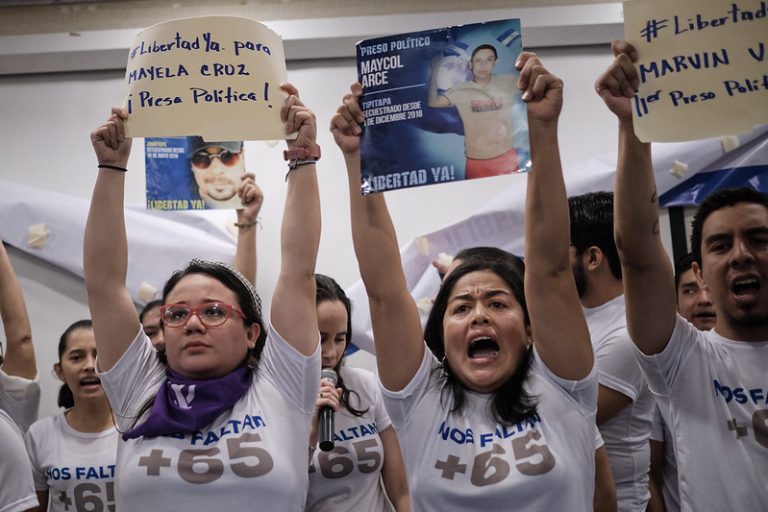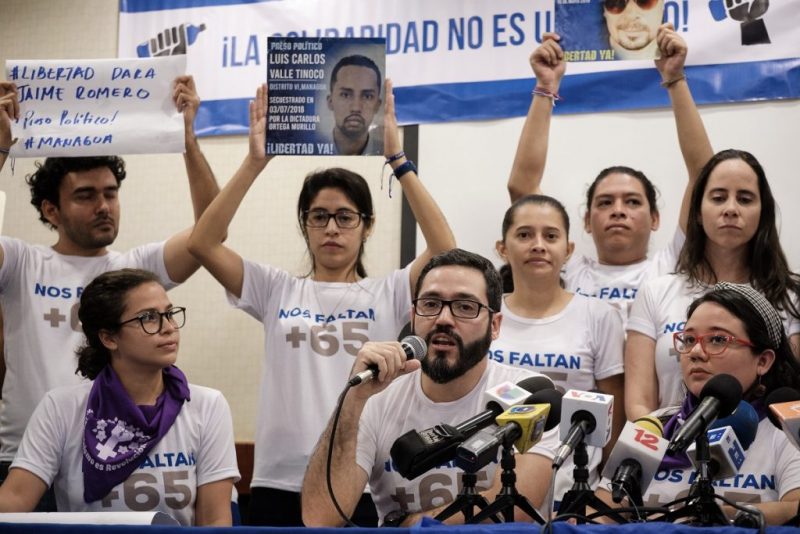10 de enero 2020

News About Sheynnis Palacios Not Covered by Media Operating in Nicaragua

PUBLICIDAD 1M
PUBLICIDAD 4D
PUBLICIDAD 5D
Young activists declare that they won’t leave Nicaragua despite the persecution and threats they receive from the paramilitary and FSLN fanatics

The sixteen young Nicaraguans known as the “water carriers” because they were arrested for trying to bring water to a group engaged in a hunger strike, denounced the fact that following their release from prison last December 30, they’ve suffered constant harassment and abuse from the regime’s police and the Ortega-allied paramilitary.
During a joint press conference, the young dissidents stated that they’re under daily siege by the police, as well as threatened by the paramilitary and sympathizers of the Ortega regime. In some cases, their houses have actually been damaged.
The best-known case is that of student leader Amaya Coppens, who has twice been imprisoned and twice released. Paramilitary allied with the regime and Sandinista fanatics have thrown rocks and motor oil against the walls of the young woman’s family home in Esteli. They’ve also shot and launched rockets into the air. In a separate, earlier incident, her brothers were attacked in the street.
Another case is that of Roberto Buschting, who scant hours after being freed was intimidated by the head of Matagalpa’s paramilitary forces, together with some police dressed in civilian clothes who verbally attacked him.
Mistreated in prison
The youth were all detained on the night of November 14, 2019, when they were bringing water and medicine to relatives of the political prisoners holding a hunger strike in the San Miguel Archangel church in Masaya to demand that their family members be liberated. The police had implemented a tight cordon around the church that prevented people from entering or leaving the church.
Ivania Alvarez, one of the water-carriers, stated that during their more than 40 days locked up, they suffered “mistreatment, medical negligence, threats, blows and a countless number of due process violations.”
The best-known case was that of Neyma Hernandez, who despite suffering from thyroid and heart problems wasn’t given medical attention in jail until the other youth began their own hunger strike. She and Amaya Coppens also suffered sexual abuse.
Exile not an option for them
Despite the besiegement and the threats, the youth declared that they haven’t considered abandoning Nicaragua and going into exile as thousands of other Nicaraguans have done to escape the repression of the Ortega-Murillo regime.
“We’re clear that the struggle is here [in Nicaragua]. We know that over 90 thousand Nicaraguans have had to leave due to the repression; however, as a group, we’re committed to being in Nicaragua,” said Jesus Tefel.

Released prisoner Jesus Tefel, member of the Blue and White National Unity, speaks during a press conference held by the water carriers. Photo: Carlos Herrera
“Those days that we spent kidnapped (by the regime) won’t make us change our minds; we’re betting on the non-violent civic struggle, and because of that we’re not afraid,” he added.
Coppens highlighted the fact that they’re “firmly” committed to “the liberation” of all the political prisoners, since there are still more than 65 dissidents in the regime’s “dungeons”.
Waiting for the trial
The young people were released under the regime’s house arrest policy known as “family coexistence”, since their trial, currently scheduled for January 30, is still pending. The regime’s justice department accuses them, with no evidence, of illegal arms trafficking.
The case is being handled in Managua’s Ninth District Penal Court, under the direction of the Ortega-allied judge Edgar Altamirano. In the past, Judge Altamirano has imposed ridiculous and illegal sentences against political prisoners. For example, he sentenced farm leader Medardo Mairena to 216 years in jail for fabricated charges. Mairena was released in June of 2019 under the controversial Amnesty Law.
Alvarez mentioned that “they’ve been treated as if guilty,” despite the fact that they haven’t been tried, which demonstrates “once again, the complete control that the regime exerts over the judicial system and the police in Nicaragua.”
Tefel insisted: “Nothing is normal in Nicaragua. We’re living in a police state, the people continue suffering harassment, death, persecution and censorship, on a daily basis.”
Archivado como:
PUBLICIDAD 3M
Confidencial es un diario digital nicaragüense, de formato multimedia, fundado por Carlos F. Chamorro en junio de 1996.
PUBLICIDAD 3D